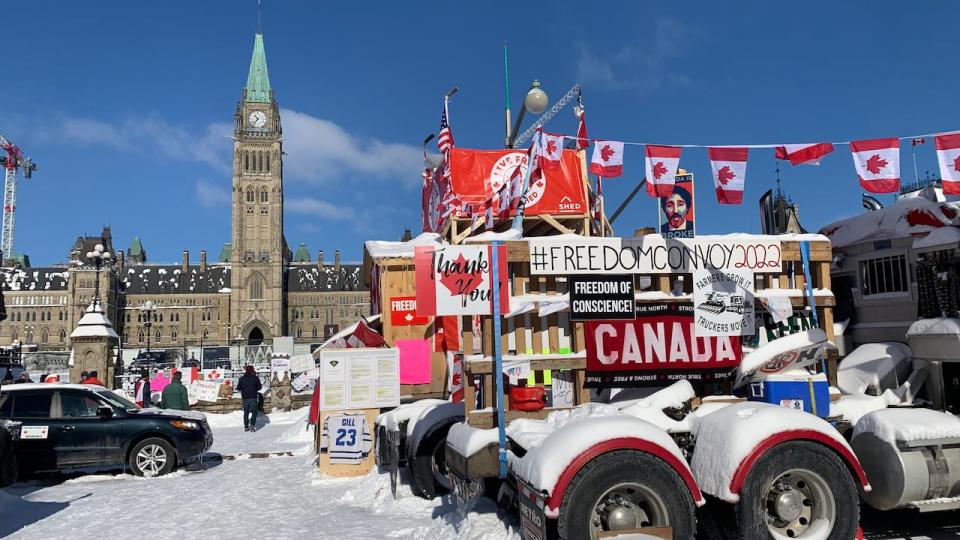Defence calls resident testimony in 'Freedom Convoy' trial unnecessary

The lawyer for Tamara Lich, co-organizer of the self-described "Freedom Convoy," is warning that an already slow-moving trial could drag on for ages if downtown residents and business owners are allowed to testify.
Lich and co-accused Chris Barber are facing charges that include mischief, counselling others to commit mischief, intimidation and obstructing police for their role in the weeks-long protest that snarled up downtown Ottawa in winter 2022.
As their trial enters its second week, defence lawyer Lawrence Greenspon looked to block the testimony of eight or nine Crown witnesses whose testimony he cast as irrelevant to anything at issue in the case.
"We all know where this is going. This is going to be the, 'Oh woe is me, look what happened to me, how my life was impacted, look how my business suffered,'" he said after proceedings ended on Monday.
"If that evidence was to be called as part of the trial, then we're perfectly entitled as the defence to call a whole bunch of businesses that prospered during the Freedom Convoy."
'Best evidence' will come from civilians, Crown says
Crown lawyer Siobhain Wetscher called the evidence of the witnesses "critical." She said they lived through the disruption the convoy inflicted on downtown Ottawa, and could give first-hand observations relevant to its impact on the city.
But Greenspon said the evidence is unnecessary because the defence is willing to admit to some of those allegations, including that "there were individuals who interfered with the enjoyment of property" in downtown Ottawa.
"We've made that admission, so why do we have to spend two and a half days, and it may be more, getting the Crown to prove that we've admitted it?" he said.
According to Greenspon, the Crown is effectively trying to introduce witness impact statements in the middle of a trial. He said Crown lawyers have been unresponsive to his attempts to negotiate the text of an admission that could satisfy everyone.
"All they said is, 'We don't want to, we don't have to, and the court shouldn't make us.' That's their position in a nutshell," Greenspon said of the Crown.

Protestors gather in front of Parliament Hill in February 2022, as part of 'Freedom Convoy' demonstrations. The Crown lawyer in the trial of lead convoy organizers says evidence from the people and businesses who lived through the convoy is 'critical.' (CBC/Radio-Canada)
Wetscher said she foresees disagreement over the extent of the disruption and gridlock caused by the convoy. She said a sample of citizens who lived through it will provide better evidence of the facts than anything the defence will admit.
She went through the witnesses one by one, detailing their struggles with noise, traffic, urination, garbage, blocked deliveries and the smell of exhaust.
"The Crown maintains that the best evidence will come from the civilians, as is its right, and we respectfully declined the admission," she said.
One of the witnesses on the Crown's list is Zexi Li, a plaintiff in a civil trial against the convoy organizers. Justice Heather Perkins-McVey, who is presiding over the criminal trial, noted that Li "may have an underlying motive" for testifying.
Value of witness testimony could be limited
Perkins-McVey questioned whether any of the witnesses, who never had any direct dealings with either of the accused, would be of much value to the Crown's case.
"The value of some of this evidence might be quite limited," she said. "I just don't know if this evidence is going to have the weight that you hope."
Like Greenspon, she said it could open the door to the defence calling witnesses from businesses that were "run off their feet" by patrons from the convoy. She mentioned Tim Hortons as one example.
If that door is opened, she worried, "the trial will run on ad infinitum." (Ad infinitum is a Latin phrase meaning "to infinity.")
Greenspon is expected to reply to the Crown's arguments later this week. Pending that, Perkins-McVey has made no decision on whether she will hear from the witnesses.
But even if she does, she plans to keep them on a tight leash. She said she'd act as a "gatekeeper" to allow only relevant testimony.
"It'll be a very tight gate," she said. "There will be lots of locks on the gate if I allow the witnesses to testify."


